新概念英语第二册语法解析及练习题
高一英语《新概念英语第二册》语法精粹(含习题) “It”的用法和“There be”结构
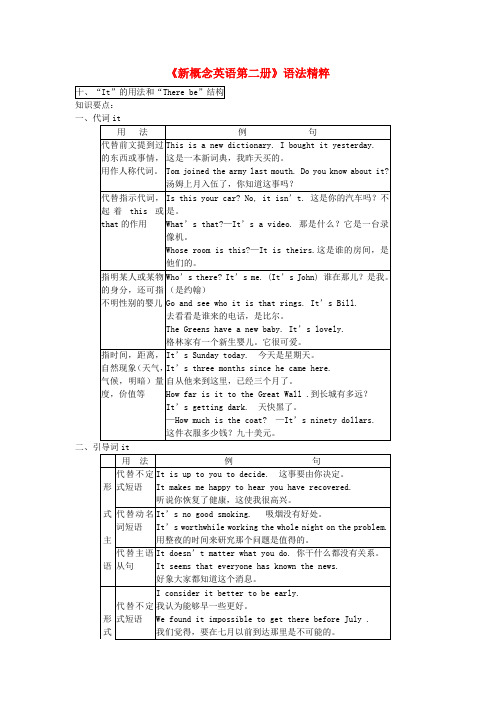
《新概念英语第二册》语法精粹知识要点:一、代词it三、it在强调结构中it的用法1、“Do you like fish?”“Yes, I like.”A.×B.it C.that D.them2、 today?A.How is it B.What is it C.What is it like D.How is the weather.3、“Do you want a watch?”“.”A.Yes, I want it . B.Yes, I want one. C.No, I’ve got it.D.No, I’ve got the watch.4、“Whose exercise-book is that?” “hers”A.That is B.This is C.It’s D.Its5、won’t take long to get to Shanghai by air.A.That B.He C.It D.This6、What he has done helps us a lot, ?A.isn’t he B.doesn’t he C.isn’t it D.doesn’t it7、We all thought no use doing that.A.it B.that C.this D.there8、I took it for granted you would come to our party.A.when B.why C.for what D.that9、How happy to be able to study and live together with you!A.that will be B.is it C.will it be D.it will be 10、I thought it to be .11、 very foolish of you to say so.A.It’s B.Its C.That’s D.This12、It’s not his habit for things.A.asks B.ask C.to ask D.asked13、It has been a great honour coming to visit me.A.they B.you C.she D.he14、I found to hear what he said.A.that difficulty B.it difficulty C.that difficultD.it difficult15、He is fifty , but doesn’tA.look at it B.look for it C.look it D.look him16、It was who telephoned me yesterday.A.him B.his C.himself D.he17、The sentence is wrong.A.its B.it C.itself D.it’s18、 is no doubt that he will succeed in his experiment.A.It B.This C.That D.There19、It seems John’s not coming after all.A.this B.that C.if D.to20、 was a handbag that John gave Mary at Christmas.A.It B.This C.That D.Such21、Was the room the famous writer had ever lived in?A.that, it B.it , that C.it , where D.that, which 22、 is said that he has been to many places in the United States.A.This B.He C.It D.That23、What you want me to do?A.it is B.that C.is this D.is it that24、Is not important who will go?A.it B.that C.this D.×25、Why is it everyone thinks he’s a thief?A.because B.as C.when D.that26、 being Sunday, the library was closed.A.What B.It C.That D.This27、Is believed he is ill?A.it, that B.he, that C.it, if D.he, for28、 is known to us Mary dances best.A.She, ×B.It, that C.It, she D.She, who29、“What’s this?”“ a f lag.”A.This is B.That’s C.It’s D.Its30、Jack is ill. Have you heard about ?A.him B.it C.this D.thatThere be 结构31、Is a typewriter in the room?32、There’s no one in the house, is ?A.it B.he C.there D.they33、 must be something wrong.A.It B.He C.There D.They34、 there anyone around?A.Was B.Were C.There D.Has35、 used to be a church round the corner.A.Here B.There C.It D.It is36、It is reported that is going to be a storm.A.it B.there C.×D.the weather37、There still a lot of work to be done before the house is ready for occupation.A.are B.were C.is D.have38、There is a girl for the bus.A.to wait B.waiting C.waited D.wait39、There a pine tree at the top of the hill.A.stands B.lies C.lives D.has40、 will be a good film on at the Rex next week.A.There B.It C.That D.This改错,下列每句所给的选项中,各有一项是错的,请指出并改正。
《新概念英语第二册》语法精粹(含习题):句子

《新概念英语第二册》语法精粹十三、The Sentences知识要点:句子按使用的目的可分为四类:1、陈述句2、疑问句3、祈使句4、感叹句从结构上看句子可分为三种类型:[来源:Z#xx#]1、简单句2、并列句3、复合句一、句子的种类(Kinds of Sentences)1、陈述句:(1)肯定句:We love our motherland. 我们热爱祖国。
(2)否定句:They don’t go to work on Sundays. 他们星期日不上班。
说明:叙述或否定一个事实或看法。
[来源:学科网]2、疑问句:(1)一般疑问句:Are you a worker? 你是个工人吗?Yes, I am. 是的,我是工人。
Haven’t you seen the film? No, I haven’t. 你没看过这部电影吗?没看过。
说明:以一个助动词,情态动词或动词be开始的问句。
回答要用yes或no。
(2)特殊疑问句:Who is the man? 这人是谁?When do you watch TV? 你什么时间看电视?[来源:学|科|网Z|X|X|K]What are they doing now? 他们现在正在干什么?说明:以一个疑问代词或疑问副词开头的句子一般要用倒装句语序(或称为疑问词加一般疑问句)(3)选择疑问句:Do you want tea or coffee? Either will do. 你要茶水还是要咖啡?哪种都行。
Does he learn Japanese or French? He learns French. 他学日语还是学法语?他学法语。
说明:提出两个或两个以上的情况,选择一个作为答案。
(4)反意疑问句:They are going to the airport, aren’t they? 他们要去机场,是吗?You haven’t finished your homework, have you? 你没做完作业,是吗?说明:提出情况或看法问对方是否同意。
新概念英语第二册语法精粹及练习
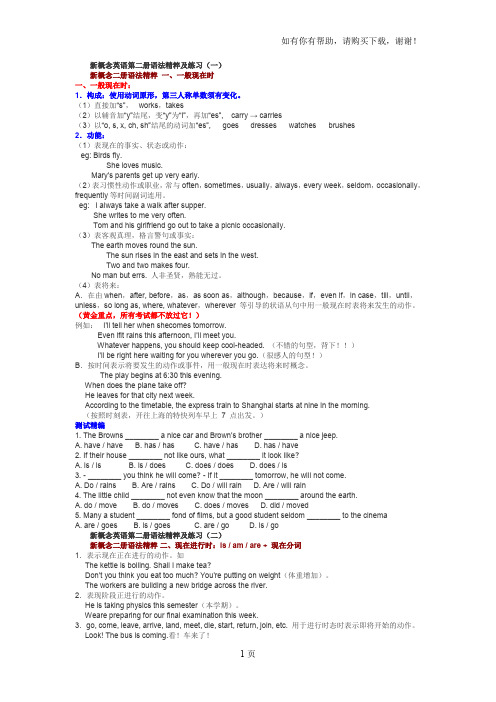
新概念英语第二册语法精粹及练习(一)新概念二册语法精粹一、一般现在时一、一般现在时:1.构成:使用动词原形,第三人称单数须有变化。
(1)直接加“s”,works,takes(2)以辅音加“y”结尾,变“y”为“i”,再加“es”,carry → carries(3)以“o, s, x, ch, sh”结尾的动词加“es”, goes dresses watches brushes2.功能:(1)表现在的事实、状态或动作:eg: Birds fly.She loves music.Mary's parents get up very early.(2)表习惯性动作或职业,常与often,sometimes,usually,always,every week,seldom,occasionally,frequently等时间副词连用。
eg: I always take a walk after supper.She writes to me very often.Tom and his girlfriend go out to take a picnic occasionally.(3)表客观真理,格言警句或事实:The earth moves round the sun.The sun rises in the east and sets in the west.Two and two makes four.No man but errs. 人非圣贤,熟能无过。
(4)表将来:A.在由when,after, before,as,as soon as,although,because,if,even if,in case,till,until,unless,so long as, where, whatever,wherever 等引导的状语从句中用一般现在时表将来发生的动作。
(黄金重点,所有考试都不放过它!)例如:I'll tell her when shecomes tomorrow.Even ifit rains this afternoon, I'll meet you.Whatever happens, you should keep cool-headed. (不错的句型,背下!!)I'll be right here waiting for you wherever you go.(很感人的句型!)B.按时间表示将要发生的动作或事件,用一般现在时表达将来时概念。
新概念英语第二册语法解析及练习题分享
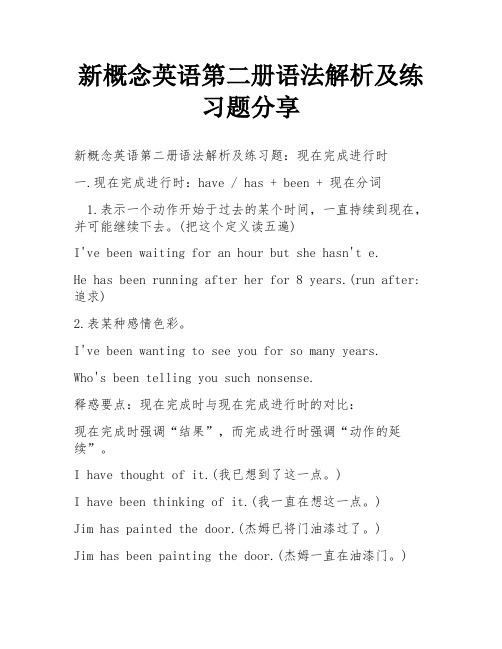
新概念英语第二册语法解析及练习题分享新概念英语第二册语法解析及练习题:现在完成进行时一.现在完成进行时:have / has + been + 现在分词1.表示一个动作开始于过去的某个时间,一直持续到现在,并可能继续下去。
(把这个定义读五遍)I've been waiting for an hour but she hasn't e.He has been running after her for 8 years.(run after: 追求)2.表某种感情色彩。
I've been wanting to see you for so many years.Who's been telling you such nonsense.释惑要点:现在完成时与现在完成进行时的对比:现在完成时强调“结果”,而完成进行时强调“动作的延续”。
I have thought of it.(我已想到了这一点。
)I have been thinking of it.(我一直在想这一点。
)Jim has painted the door.(杰姆已将门油漆过了。
)Jim has been painting the door.(杰姆一直在油漆门。
)练习:1. They ________ us since five o'clock this morning.A. are helpingB. have been helpingC. have been helpedD. have helped2. I ________ the book the whole day, yet I haven't finished it.A. have been readingB. have readC. am readingD. had been reading3. Please e in. We ________ about your paper.A. talkB. had been talkingC. have been talkingD. would have talked4. Such natural resources as coal and petroleum________.A. gradually are exhaustedB. are being gradually exhaustedC. have gradually exhaustingD. have been exhausting gradually5. It ________ almost every day so far this month.A. is rainingB. rainedC. rainsD. has been raining用所给动词正确时态填空。
新概念英语2语法练习

新概念英语2语法练习### 新概念英语2语法练习#### 一、名词的数1. 单数与复数- 规则名词的复数形式通常在词尾加上 -s 或 -es。
例如:cat → cats, box → boxes。
2. 不可数名词- 不可数名词没有复数形式,通常表示物质、集合名词或抽象概念。
例如:water, furniture, happiness。
3. 特殊名词的复数形式- 一些名词的复数形式不规则,需要特别记忆。
例如:man → men, woman → women, child → children。
#### 二、动词的时态1. 一般现在时- 表示经常发生的动作或状态。
例如:She goes to school every day.2. 一般过去时- 表示过去发生的动作或状态。
例如:He visited his grandparents last weekend.3. 一般将来时- 表示将来发生的动作或状态。
例如:They will go to the cinema tonight.#### 三、冠词的使用1. 不定冠词- 用于表示数量上的“一”。
例如:A cat is sitting on the mat.2. 定冠词- 用于特指某物。
例如:The book on the table is mine.3. 零冠词- 在某些固定短语或专有名词前不使用冠词。
例如:Go to school, United States.#### 四、形容词和副词的比较级和最高级1. 规则变化- 一般形容词和副词的比较级在词尾加 -er,最高级加 -est。
例如:bigger, biggest。
2. 不规则变化- 一些形容词和副词的比较级和最高级形式不规则。
例如:good→ better → best。
3. 比较级和最高级的用法- 比较级用于比较两者,最高级用于三者或三者以上。
例如:Sheis taller than me. He is the tallest in the class.#### 五、介词的用法1. 时间介词- 表示时间的介词,如 at, in, on。
(完整word版)新概念英语第二册课后习题答案详解and单元测试答案(全)

新概念英语第二册课后习题答案详解Lesson 11。
b选b最为正确。
因为a。
d。
都与课文内容不符合,也不合乎逻辑;c.的意思是“他们没有注意他”,而作者的意图并不是想让他们注意他,而是想让他们停止谈话。
所以选b. 最能表达作者当时心里的感受。
2.c其余3个答案都与原句意思不符合.3.b因为a. to 不对,可以是He went to the theatre;c. into 也不对,可以是He went into the theatre;d。
on 更不符合语法,表示在某一个地方用介词in 或at, in 表示在大的空间,如国家,城市等,at 则表示在小的地点或空间,如atthe office, at the theatre 等, 所以选b.是正确的.4.db。
above(在……上方);c。
ahead of (在……的前面,在……之前)不和behind 对应,也不强调位置的前后顺序。
a. before 和 d. infront of 都是和behind对应的,都有“在……前面”的意思.但in front of 更具体的强调位置,而before则包含更宽泛的意思,即时间上,空间,次序,登记,重要性方面的“在……前面”5.c因为用 a. Where, b. why, d. when 提问都不符合逻辑,都不是针对状态提问的,只有How提问,才能用Angry回答.6.ab。
they 只做主语; c. their只能做定语;d. us 虽然可以做宾语,但与前一句意思不符合.7.da. none是代词,很少用在名词前面;b。
any 只能用在否定句或疑问句中;c。
not any 不符合语法,因为前面没有助动词did。
8。
ba. chair(椅子), c。
armchair(手扶椅) d. class(班级) 这3个选择都和seat的意思不符合。
Seat 是”座位,座席”的意思. 强调的是可供坐下的地方,不是具体的椅子。
《新概念英语》第二册语法精粹(讲练及答案)
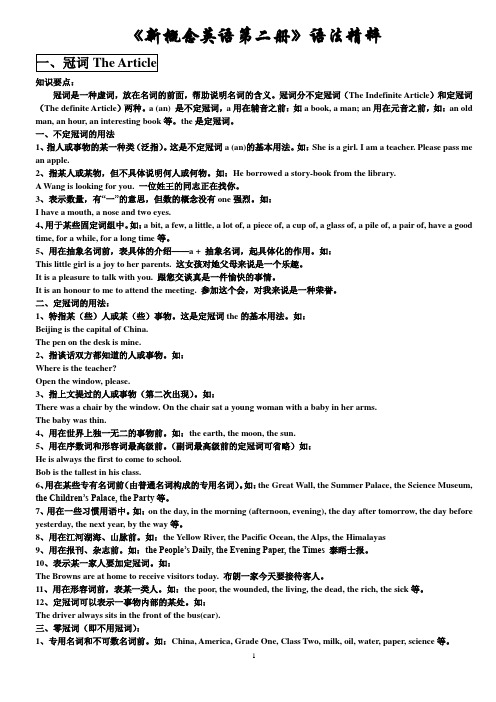
《新概念英语第二册》语法精粹知识要点:冠词是一种虚词,放在名词的前面,帮助说明名词的含义。
冠词分不定冠词(The Indefinite Article)和定冠词(The definite Article)两种。
a (an) 是不定冠词,a用在辅音之前:如a book, a man; an用在元音之前,如:an old man, an hour, an interesting book等。
the是定冠词。
一、不定冠词的用法1、指人或事物的某一种类(泛指)。
这是不定冠词a (an)的基本用法。
如:She is a girl. I am a teacher. Please pass me an apple.2、指某人或某物,但不具体说明何人或何物。
如:He borrowed a story-book from the library.A Wang is looking for you. 一位姓王的同志正在找你。
3、表示数量,有“一”的意思,但数的概念没有one强烈。
如:I have a mouth, a nose and two eyes.4、用于某些固定词组中。
如:a bit, a few, a little, a lot of, a piece of, a cup of, a glass of, a pile of, a pair of, have a good time, for a while, for a long time等。
5、用在抽象名词前,表具体的介绍——a + 抽象名词,起具体化的作用。
如:This little girl is a joy to her parents. 这女孩对她父母来说是一个乐趣。
It is a pleasure to talk with you. 跟您交谈真是一件愉快的事情。
It is an honour to me to attend the meeting. 参加这个会,对我来说是一种荣誉。
《新概念英语》第二册语法精粹(含答案)
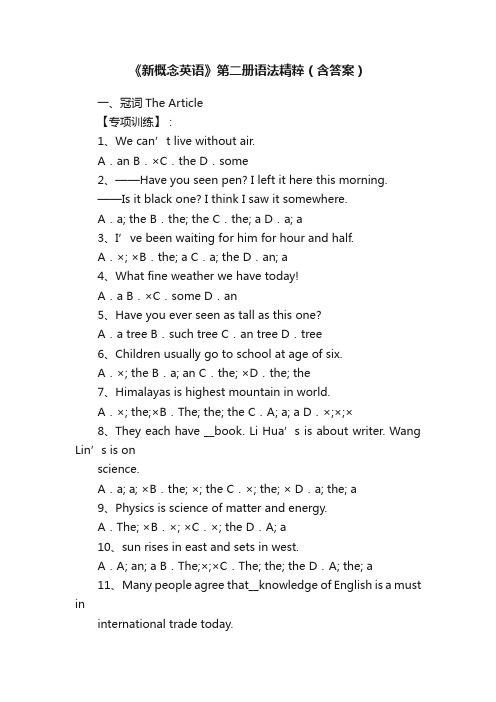
《新概念英语》第二册语法精粹(含答案)一、冠词The Article【专项训练】:1、We can’t live without air.A.an B.×C.the D.some2、——Have you seen pen? I left it here this morning.——Is it black one? I think I saw it somewhere.A.a; the B.the; the C.the; a D.a; a3、I’ve been waiting for him for hour and half.A.×; ×B.the; a C.a; the D.an; a4、What fine weather we have today!A.a B.×C.some D.an5、Have you ever seen as tall as this one?A.a tree B.such tree C.an tree D.tree6、Children usually go to school at age of six.A.×; the B.a; an C.the; ×D.the; the7、Himalayas is highest mountain in world.A.×; the;×B.The; the; the C.A; a; a D.×;×;×8、They each have __book. Li Hua’s is about writer. Wang Lin’s is onscience.A.a; a; ×B.the; ×; the C.×; the; × D.a; the; a9、Physics is science of matter and energy.A.The; ×B.×; ×C.×; the D.A; a10、sun rises in east and sets in west.A.A; an; a B.The;×;×C.The; the; the D.A; the; a11、Many people agree that__knowledge of English is a must ininternational trade today.A.a;×B.the; an C.the; the D.×; the12、__Mr Jones called while you were out (neither of us knows this man).He was in badtemper. A.×;a B.A;×C.The; the D.A; a13、They were at dinner then. It was delicous one.A.a; the B.×;×C.×;a D.a; a14、what kind of car do you want to buy?A.×B.the C.a D.an15、Alice is fond of playing piano while Henry is interested in listening to music.A.×; the B.×;×C.the; ×D.the; the16、Beyond stars, the astronaut saw nothing but space.A.the; ×B.×; th e C.×;×D.the; the17、Alexander Graham Bell invented telephone in 1876.A.×B.a C.the D.one18、——Where’s Jack?——I think he’s still in bed, but he might just be inbathroom.A.×;×B.the; the C.the; ×D.×; the19、Many people are still in habit of writing silly things in publicplaces.A.the; the B.×;×C.the; ×D.×; the20、——I’d like information about the management of your hotel, please.——Well, you could have word with the manager. He might be helpful.A.some; a B.an; some C.some; some D.an; a【答案】:1、B air是不可数名词。
- 1、下载文档前请自行甄别文档内容的完整性,平台不提供额外的编辑、内容补充、找答案等附加服务。
- 2、"仅部分预览"的文档,不可在线预览部分如存在完整性等问题,可反馈申请退款(可完整预览的文档不适用该条件!)。
- 3、如文档侵犯您的权益,请联系客服反馈,我们会尽快为您处理(人工客服工作时间:9:00-18:30)。
新概念英语第二册语法解析及练习题•相关推荐新概念英语第二册语法解析及练习题新概念英语第二册语法解析及练习题1过去完成时:had +过去分词1.表示过去某个动作或某个具体时间之前已经发生、完成的动作。
“过去的过去”。
● They had got everything ready before I came.● The play had begunbefore I got to the theater with my boyfriend.2.过去完成时常用于hardly / scarcely ... when, no sooner ... than等固定句型结构中。
(此乃超级重点句型,意为:“一……就”)● She had hardly / scarcely gone to bed when the bell rang.● No sooner had he arrived at the railway station than he met her parents.(注意no sooner在句首时句型倒装。
)3.intend(打算),mean(意味),hope(希望),want(想要),plan(计划)等动词的'过去完成时用来表示本打算做而没有做的事。
● I had intended to call on you yesterday, but someone came to see me just when I was about to leave.(……原想昨天去看你……)● They had planed to hold a football mat ch last week, but they had to cancel it because the bad weather.(……原计划上周举行一场足球赛……)练习:1. -Let's hurry! The president is coming. -Oh, I was afraid that we ________.A. already miss himB. had already missed himC. will miss him alreadyD. have already missed him2. Your letter came just as I ________ my office.A. was leavingB. would leaveC. had leftD. left3. I ________ my keys, I can't remember where I last sawthem.A. was losingB. lostC. had lostD. have lost4. Nobody knew where the teacher ________.A. has goneB. would have goneC. had goneD. would be gone5. The sportsmen ________ training for 3 hours when the coach told them to break off for rest.A. have beenB. areC. had beenD. were答案:1. B2. A3. D4. C5. C新概念英语第二册语法解析及练习题2过去将来进行时:should / would be +现在分词表示从过去某时看将来某时正在进行的动作。
. He asked me what I should be doing when he came the next day.练习:1. Tomorrow, I ________ the book all morning.A. am readingB. will be readingC. will readD. have read2. -"Can you attend the meeting tonight?" -"No, ________ the manager aboutsomething urgent."A. I seeB. I'll have seenC. I'll be seeingD. I can see3. Of the millions who saw Haley's comet in 1986, how many people ________long enough to see it return in the twenty-first century?A. will they liveB. they will be livingC. will liveD. living4. He told us that he ________ visiting Japan by this time next year.A. will beB. would beC. wasD. is5. It ________ when you wake up tomorrow morning.A. is snowingB. will snowC. will be snowingD. snows答案:1. B2. C3. C4. B5. C新概念英语第二册语法解析及练习题3过去完成进行时:had been +现在分词表示过去某个时间之前一直在进行的动作。
● She said that she had been typing a paper before I came in.比较:. The girl had cleaned up the room, so it was tidy.. The girl had been clearing up the room, so we had to wait outside.练习:1. It ________ for four days when we arrived, so the roads were very muddy.A. was rainingB. would be rainingC. had been rainingD. has rained2. He told us that he ________ there since 1982.A. has been livingB. had been livingC. would have livedD. was living3. He had been learning English for 3 years before he came here and________ now.A. is still learningB. had been learningC. was still learningD. has been learning4. By the end of last week, he ________ in the company for 10 years.A. had workedB. had been workingC. will have workedD. would have worked5. Not until then did people know that he ________ important militaryinformation to the enemy for a long time.A. soldB. would sellC. had soldD. had been selling答案:1. C2. B3. A4. B5. D新概念英语第二册语法解析及练习题4一般将来时:shall / will +动词原形1.表示将要发生的动作或存在的状态。
● He will graduate from the college next year.● We shall finish our work as quickly as possible.2.将来时的其它结构:(务必背下!)I. be going to do something.打算做某事。
(美国口语中常读作be gonna)● I'm going to buy a new coat this fall.[be going to与will的对比:下列情况须用will ]● I'll be sixteen years old next year.● It will be the 20 th of August tomorrow.● When he comes, I will give him your message.I. be + to do sth.表示计划安排做某事或用来征求意见。
● A m I to take over his work?● We are to meet at the gate.III. be about to do sth.即将做某事。
● The talk is about to begin.3.重点补充:be on the point of doing sth.正要做某事set out to do sth.着手做某事set about doing sth.开始做某事练习:1. - "The meeting is scheduled to begin at 7 o'clock."- "But ________ a delay."A. it will beB. there'd beC. there will beD. there is2. He'll leave for Paris before you ________ next week.A. will come backB. will be backC. come backD. came back3. Our next meeting ________ on 1st December.A. has been heldB. will holdC. is to be heldD. is holding4. Where ________ a will, there is a way.A. there will haveB. has been thereC. there isD. there has been5. It ________ be Wednesday tomorrow.A. is going toB. willC. is about toD. is to答案:1. C2. C3. C4. C5. B新概念英语第二册语法解析及练习题5过去将来时:should / would +动词原形1.表示从过去某个时刻看将要发生的动作或状态。
